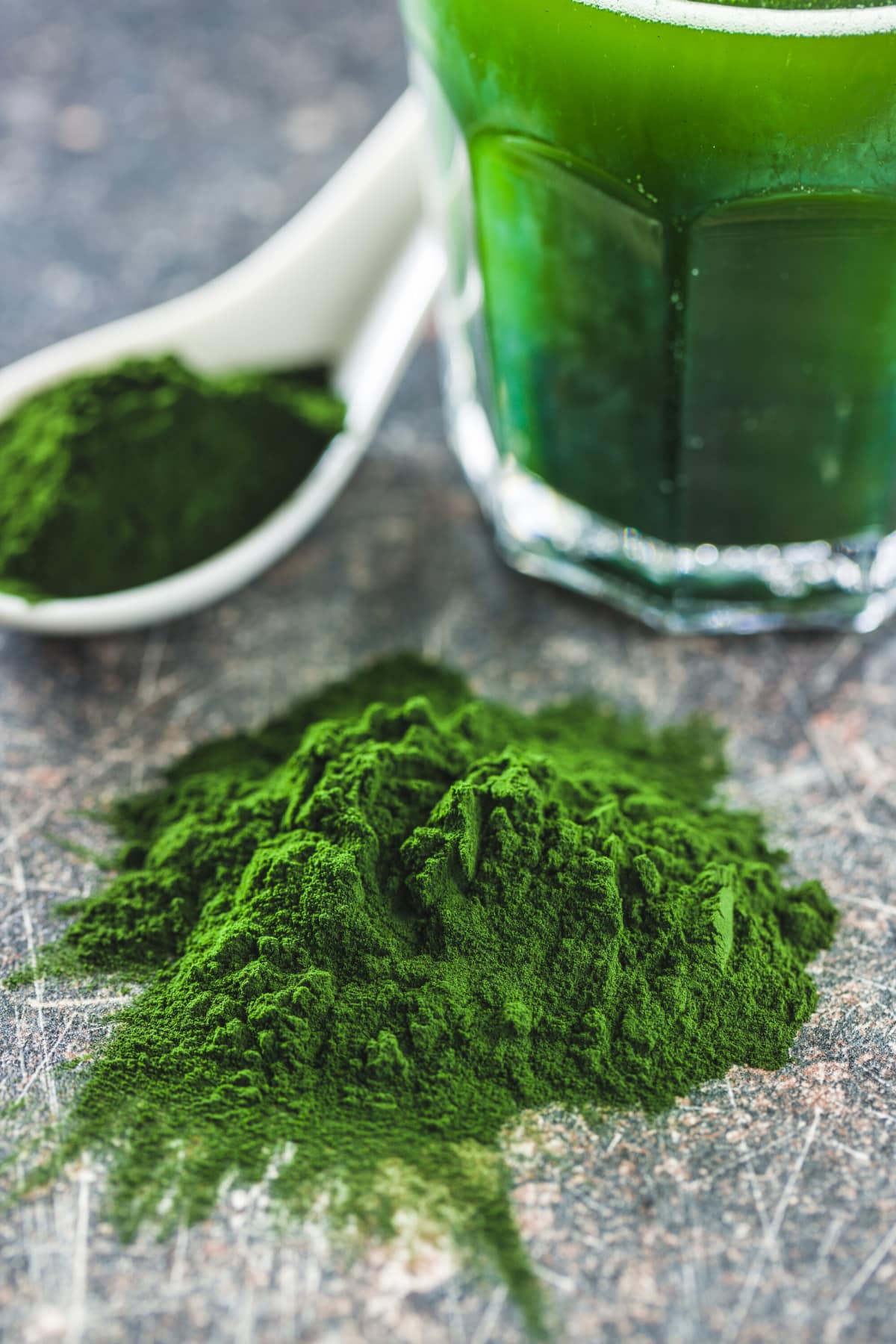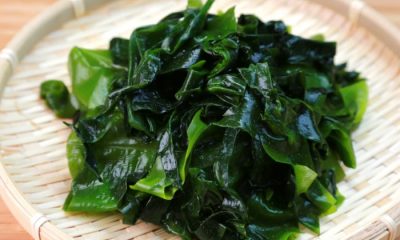Food
7 Benefits of chlorella and side effects

Discover the 7 shocking health benefits of Chlorella and side effects.
Looking for an all-natural supplement that increases your energy, contributes to fat loss, and helps detoxify heavy metals like lead and mercury from your body? If so, freshwater algae called chlorella may be exactly what you need.
It is an alga native to Asia, specifically Japan and Taiwan, which has the peculiarity of being loaded with phytonutrients that include: B complex vitamins, potassium, magnesium, phosphorus, chlorophyll, and amino acids.
Chlorella is a blue-green alga like its spirulina cousin, and we’ll compare the nutrients in these superfoods later in the article.
Studies have shown that chlorella benefits the entire body by supporting healthy hormonal function, promoting cardiovascular health, helping to negate the effects of chemotherapy and radiation, lowering blood pressure and cholesterol, and assisting in the detoxification of our bodies.
The impressive green color of this rich algae is due to the high concentration of chlorophyll that resides on them.
It is well known that most of the time they recommend the consumption of a large amount of green leafy vegetables to fortify and improve health, but sometimes it can be difficult to obtain the minimum of servings recommended by specialists in functional medicine.
While juicing is another option, it is simply too slow for most people. And frankly, most leafy greens pale in comparison to the health benefits this alga can provide.
By consuming organic supplements of this alga at a low temperature, you can receive all the benefits in powder or tablet form.
Chlorella has been proven to be excellent algae for general body health
Chlorella Nutrition Facts
As you’re about to see, this interesting freshwater algae is one of the most nutrient-dense superfoods in the world.
A 1-ounce (3 tablespoons) serving of chlorella contains:
• Protein – 16g
• Vitamin A— 287% RDA
• Vitamin B2— 71% RDA
• Vitamin B3— 33% RDA
• Iron— 202% RDA
• Magnesium – 22% RDA
• Zinc— 133% RDA
In addition, it contains a good amount of vitamin B1, vitamin B6, and phosphorus.
When you look at its nutrient density score, it’s easy to see why it’s ranked as one of the top 10 healthy foods in the world. It’s more nutrient-dense per gram than other vegetables, including kale, spinach, and broccoli!
Health benefits of Chlorella
Here are seven scientifically proven health benefits of chlorella that you can expect from incorporating this superfood into your daily diet.
1.- Detoxifies heavy metals
If you have mercury fillings in your teeth, have been vaccinated, eat fish regularly, have been exposed to radiation, or consume food from China, there may be heavy metals lurking in your body.
It is important to your overall health and wellness to be proactive in detoxifying heavy metals and toxins.
One of the most important health benefits of these algae is that it envelops even persistent toxins that reside in our bodies, such as lead, cadmium, mercury, and uranium, and prevents them from being reabsorbed.
It is believed that the recurrent consumption of this algae can benefit your body, preventing the so-called heavy metals from agglomerating in the organs of the human body.
2.- Detoxifies the body
Both radiation therapy and chemotherapy are the two most widely used forms of cancer treatment in science.
Anyone who has undergone any of these treatments, or knows someone who has, knows what cost it will charge to the body.
One of the demonstrations that have been evidenced during the last decade is that chlorella has high levels of chlorophyll to its credit, which vigorously protects the human body from the effects that can be caused by ultraviolet radiation typical of this type of treatment, eliminates any trace of particular radioactive from the body.
According to research, when this freshwater alga is consumed, the normal values of both the cellular components and the functions of the immune system are maintained, that is, they are less affected by cancer treatments.
3.- Supports the immune system
The investigations around the operation and the benefits of Chlorella have been multiple, and this has allowed us to know that the ingestion of this algae, can improve in eight weeks the activity of the so-called NK cells.
Another study is based on the responses of the immune system to the consumption of supplements based on Chlorella, showing that these algae are compatible with a healthy response of the immune system and help the activity of “natural killer” cells.
4.- Benefits of chlorella for weight loss
Losing weight is difficult, especially as we age. The ingestion of this seaweed demonstrated its ability to significantly reduce the percentage of body fat in individuals, in addition to the cholesterol and glucose present in the fasting blood.
Another benefit of chlorella is that it can help you regulate your hormonal level, in the same way, it is helpful when regulating metabolism, providing more energy, and improving circulation.
It is also good for reducing both fat and weight, and it can eliminate toxin storage.
As you know, when a person is in this weight loss process, their body tends to release a series of toxins that can be reabsorbed by the body after a few days, which is why it is important to eliminate them from the body as soon as possible. possible.
It is there, where the role of chlorella is the protagonist since this algae can surround both toxins and heavy metals to facilitate their elimination and prevent reabsorption.
5.- It makes you look younger
Research continues to reveal that chlorella can also slow the aging process, making you look younger.
It was recently revealed that these algae can greatly reduce what we know as oxidative stress, which is generally caused by poor diet, stress, and pollution.
One of the main reasons why this alga is so effective is that it can give your skin a more youthful and fresh appearance, the reason? – as it increases the levels of vitamins A, C and glutathione in the body, which eliminates all free radicals and protects cells.
Best of all is that only the intake of a teaspoon or two capsules per day of chlorella or a supplement based on these algae, the results will be evident in a few weeks.
6.- Benefits of chlorella for cancer
It is believed that all human bodies at some point develop cancer cells. Immune systems that work to perfection, have the natural ability to mitigate and destroy these cells, before they have the opportunity to create cancer, thanks to a study it was shown that chlorella favors cancer prevention in various ways.
First of all, it is believed that the preventive consumption of this algae progressively strengthens the immune system of people, that is, that the bodies will be able to respond healthily.
Second, by eradicating heavy metals and toxins from the body, it is unlikely that we can suffer from those cancers that tend to be based on the environment.
Third, it has been shown that people who have suffered from cancer can enhance the action of so-called T cells by battling abnormal cells.
Finally, as mentioned above, when people are diagnosed with cancer and undergo chemotherapy or radiotherapy treatments, this algae can help reduce side effects, so that it can be mentioned as a natural treatment for this disease.
7.- Benefits of chlorella for diabetes and cholesterol
Both diabetes and cholesterol problems are two of the diseases facing the majority of the world’s population today.
Years of poor diet, stress, and lack of sleep have led many to one or both diagnoses.
Thanks to the meticulous investigations that have been developed around chlorella, it was found that a dose of 8 thousand mm, divided into two daily doses, can significantly reduce both glucose in the blood and cholesterol.
One of the first pieces of evidence of the researchers was the reduction of cholesterol in the people who were the object of the studies, in the same way, they noticed a great improvement in the decrease in glucose, all this, thanks to the activation of cellular genes that improve insulin sensitivity, achieving a healthy balance.
Chlorella vs spirulina
While most Americans have not heard of chlorella, many people have been taking spirulina for years.
They are both aquatic organisms, but at the cellular level, they are quite different.
Spirulina like chlorella share a balance of nutrients that can help people detoxify and cleanse the entire body, plus they are loaded with a high concentration of protein that perfectly supports energy and clarity.
What’s more, spirulina has been used for years within the main nutritional programs of the World Health Organization (WHO), which seeks to eradicate malnutrition in children in underdeveloped nations.
It is estimated that a single dose of spirulina a day can compensate for the lack of vitamin A, something that as you know, can cause blindness.
The high protein levels that chlorella contains, coupled with the combination of minerals, phytonutrients, photo chemicals, and vitamins take a step forward compared to spirulina. When used in tandem, their powers are intensified.
The stiffness and hardness of the walls of chlorella make them difficult to digest.
It is believed that it is precisely the substance that this alga has in its walls that allows the absorption of heavy metals, pesticides, and other toxins that it can permanently eliminate from the human body.
Therefore, when buying a chlorella supplement, be sure to buy “cracked cell wall chlorella” because they are completely absorbable.
Side effects of chlorella
Like other algae and foods, chlorella can cause certain side effects in some people; Some of the most significant symptoms are manifested through inflammation or great sensitivity in areas such as the face and tongue to sunlight, it can also cause an upset stomach, tremors, headaches, vertigo, fatigue, lethargy and acne.
Most of these chlorella side effects and symptoms are typical of any detox program.
However, you must consult your trusted doctor, especially if you tend to experience allergic reactions to iodine or if you have recently been medicated.
How to Take a Chlorella Supplement
When taking a chlorella supplement, there are two main ways to consume it.
- Smoothie: It has a very strong flavor and therefore you will want to add about 1/2 teaspoon to a smoothie with banana, coconut water, vanilla protein powder, and lemon juice to help hide the flavor.
- Tablets: Simply take 3–6 chlorella tablets with 8 ounces of water 1–3 times a day to experience the health benefits of this interesting algae.
Food
6 Benefits of sweet orange essential oil

Table of Contents
Food
5 Benefits of drinking black tea with lemon

Table of Contents
- 1. Increases iron absorption
- 2. Fight against free radicals
- 3. Helps lose weight
- 4. Cleanses the body of toxins
- 5. A remedy for sore throat
- Related
- Discover the 5 Benefits of drinking black tea with lemon.
Black tea is one of the most consumed teas in the world. It is made from the leaves of the Camellia sinensis plant.
Its leaves are fermented in the air before being dried, cured, and packaged. Soak these leaves in the boiling water for about 5 minutes and you will get a low-calorie black tea. This has several health benefits.
The benefits can be better realized if you do not add sugar or milk to black tea. However, unsweetened black tea may not taste good, and this is where lemon comes to the rescue!
A squeeze of half a lemon not only imparts flavor but also enhances the benefits of black tea.
Unsweetened black tea, when added with a twist of lemon, is therapeutic and refreshing.
Lemon is rich in vitamin C which strengthens the immune system.
Both black tea and lemon have antioxidants that prevent heart and neurodegenerative diseases.
The stimulating and diuretic properties help increase metabolism and eliminate toxins.
The mixture also prevents us from gaining weight.
These are the benefits of adding lemon juice to your black tea.
1. Increases iron absorption
Lemon is rich in vitamin C. It also contains vitamin B6, iron, magnesium and calcium. Daily lemon consumption ensures proper growth and repair of body tissues and strengthens the immune system.
When added to tea, it also serves another important purpose. Tea is known to reduce the absorption of iron (non-heme or iron from plant sources) in the body. Lemon improves the absorption of iron in the body.
Plus, adding it to black tea doesn’t hamper its nutritional benefits, making the duo a healthy combination to consume.
2. Fight against free radicals
Both black tea and lemon juice have antioxidants that remove free radicals from our bodies. While black tea has theaflavins, lemon juice has ascorbic acid, or vitamin C, which together remove a greater number of free radicals from the body.
These potentially keep brain-damaging diseases like Parkinson’s and Alzheimer’s at bay. Antioxidants also help prevent the hardening of the arteries, kidney stones, and heart attacks.
3. Helps lose weight
Black tea contains caffeine, which is a stimulant. Stimulants generally have properties that suppress appetite, thus reducing food intake. This, in turn, helps you limit your portions and avoid overeating, ultimately preventing you from packing on those extra pounds.
Unsweetened black tea has zero calories. Lemon has about 8 calories per ounce, which is negligible. This zero-calorie drink hardly increases your body weight at all. Just avoid sugar.
Black tea also has micronutrients called catechins, which can prevent the absorption of fat in the body. And, any action that prevents fat absorption indirectly contributes to weight loss.
Also, avoiding milk, sugar, or whipped cream would be ideal, as you cut down on a ton of calories that are sure to derail your weight loss plans.
Drinking a cup of black tea with a squeeze of lemon half an hour before a meal is beneficial in achieving this goal.
4. Cleanses the body of toxins
Both caffeine and lemon juice have diuretic properties, which increase urine production. They eliminate toxins at a faster rate. This is beneficial when there is an infection, as the viruses or bacteria are expelled in a short time.
However, it is important to consult your doctor before consuming black tea with lemon during illness, as caffeine may interfere with the way some medications work.
5. A remedy for sore throat
Adding honey to black tea with lemon makes it a perfect therapy for sore throats and colds. While caffeine acts as a stimulant and pain reliever, the lemon flushes out toxins and the honey provides a soothing effect on the throat.
Drinking a cup of this concoction twice a day will help you get rid of the infection faster. It also acts as a detoxifier by aiding digestion.
Black tea with lemon is safe for regular consumption. Simply limit consumption to a cup or two per day. And don’t add sugar or milk.
Food
10 Benefits Of Sesame You May Not Know About

Table of Contents
- Health Benefits of Sesame
- Words of caution
- Related
- Discover the 10 Benefits Of Sesame You May Not Know About.The main benefits of sesame lie in its high antioxidant content and it is a rich source of vitamins and minerals, including magnesium, phosphorus, iron, omega 6, calcium, vitamins B and E, which play several important roles in overall health.
- The sesame seeds also called sesame seeds are derived from an unremarkable plant of the genus Sesamum and bear the scientific name of Sesamum indicum. Sesame seeds are considered the oldest oilseed crop in the world and have been cultivated for more than 3,500 years.There is evidence of its native forms in both Africa and India. It is extremely hardy and grows in places where many other crops do not, which is why it persisted throughout the ages. Even though it is a seed, it can still bother people with allergies, and it has a distinctly nutty taste.
Many of the health benefits are derived from the oils, which are found in higher concentrations in sesame seeds than in any other oilseed crop in the world. The sesame plant is no more than 3 feet tall, and the seeds are released from small pods along the axes of the plants.
The seeds are very small, only 3-4 mm long and 2 mm wide, yet 3.85 million metric tons are produced each year. They come in a wide variety of colors, depending on the variety or strain of the sesame plant.
The seeds can be purchased shelled or shelled. They are commonly added to salads, as an ingredient or topping for bread and grain products, cookies, sushi, cakes, soups, fish and meat bread, and a wide variety of other applications. You can find sesame seeds in almost every cultural kitchen in some form.
Health Benefits of Sesame
The seeds are widely spread throughout the world due to their availability and pleasant taste. The wide range of sesame health benefits is explained in more detail below.
1.- Reduce hypertension
The benefits of sesame have been linked to a reduction in hypertension in several research studies, which lowers the stress on your cardiovascular system, and helps prevent various heart conditions.
Additionally, magnesium has long been known as a vasodilator (an agent that lowers blood pressure) and sesame seeds store this essential mineral, which contains up to 25% of your daily need in a single serving.
2.- Prevent cancer
With the wide range of essential vitamins and minerals in sesame seeds, it is no surprise that it is associated with a reduced risk of cancer.
Beyond the role of these common minerals, including the powerful anti-carcinogenic effects of magnesium, another of the benefits of sesame is that it also contains phytate, a rare contraceptive compound that works as an antioxidant and reduces the effects of free radicals.
The dangerous by-products of cellular metabolism have been linked to many forms of cancer and various other conditions such as heart disease, premature aging, and cognitive malfunction.
Sesame seeds have also been linked to decreased leukemia, breast, lung, pancreas, colon, and prostate cancer.
3.- Diabetes Management
Another of the benefits of sesame is that it contains magnesium, and is connected with reducing the chances of diabetes and managing symptoms in patients who have already developed the condition.
Additionally, sesame seed oil has been shown to positively affect the impact of various diabetes medications such as glibenclamide in patients suffering from type 2 diabetes.
It improves the functionality of this medicine and also regulates the levels of insulin and glucose in the body, thus helping to control the symptoms of diabetes.
Sesame regulates insulin and glucose levels in the body
4.- Increase bone health
The impressive levels of essential minerals like zinc, calcium, and phosphorous found in sesame seeds can be a great boost to your body’s bone health.
These minerals are integral parts in the creation of new bone matter, and the strengthening/repair of bones that can be weakened by injuries or the appearance of conditions such as osteoporosis.
5.- Improve digestion
These little seeds contain a significant amount of fiber. Fiber is an important element in healthy digestion, as it increases bowel movements and helps them move through the digestive tract, as well as stimulating peristaltic movement as food moves through the smooth intestine.
This can reduce adverse conditions like constipation, as well as diarrhea, while simultaneously protecting the health of your colon and reducing the chances of gastrointestinal diseases and cancer.
Fiber also works for your heart, removing dangerous LDL cholesterol from your arteries and blood vessels, thus protecting against atherosclerosis, heart attacks, and strokes.
6.- Improve oral health
Perhaps the most notable effects of sesame benefits are its powerful effects on oral health.
The process is called oil pulling, in which certain amounts of sesame seed oil around the mouth can have a strong antibacterial and astringent effect on all aspects of oral health.
It is also closely associated with reducing the presence of the Streptococcus bacteria, a common bacteria that can wreak havoc in your oral cavities and other parts of your body.
Sesame has powerful effects on oral health
7.- Reduce inflammation
The high copper content is another benefit of sesame as it has several valuable functions, including reducing inflammation in the joints, bones, and muscles, thereby reducing pain associated with arthritis.
In addition, copper is an essential mineral for strengthening the walls of blood vessels, bones, and joints.
Finally, copper is necessary for the proper absorption of iron, a key component of hemoglobin. Therefore, adequate copper content in the body maximizes circulation and ensures that the organ systems throughout the body receive enough oxygen to function properly.
8.- Radiation protection
One of the unusual organic compounds in sesame seeds is called sesamol, and it has been associated with protecting DNA from the harmful effects of radiation.
This radiation could come from accidental sources or cancer treatment with chemotherapy and radiation therapy.
By protecting DNA from mutation due to radiation, sesame seeds can increase strength and reduce the chances of contracting other forms of cancer due to cell mutation.
9.- Skin and hair care
As mentioned, sesame seeds contain high levels of zinc, a vital component in collagen formation, which strengthens muscle tissue, hair, and skin.
Additionally, sesame seed oil has been shown to reduce the appearance of burns and marks on the skin, as well as the signs of premature aging.
10.- Activate metabolic function
Other benefits of sesame are that they contain a large number of proteins, which are broken down and reassembled as components of proteins that are usable by the human body.
This adds to overall strength, healthy cell growth, mobility, energy levels, and metabolic function.
Words of caution
Consuming too much sesame seeds can cause irritation to the stomach and colon.
They can also show up on drug tests because they contain a small amount of THC. However, both occur when consumed in very large quantities.
-

 Food1 year ago
Food1 year ago10 + Benefits of carrot juice and side effects
-

 Benefits4 months ago
Benefits4 months agoThe Benefits of Joining Gym Lumolog – Improve Your Fitness & Health
-

 Health1 year ago
Health1 year ago50 Super Healthy (And Very Often Cheap) Foods
-

 Health1 year ago
Health1 year ago5 Shocking health benefits of kinkeliba and side effects
-

 Food1 year ago
Food1 year ago8 shocking benefits of leek juice and side effects
-

 Health1 year ago
Health1 year agoBenefits of guava leaves Sensually
-

 Weight Loss1 year ago
Weight Loss1 year agoChaz Bono weight loss secret
-

 Health1 year ago
Health1 year ago13 shocking health benefits of Thai eggplant












